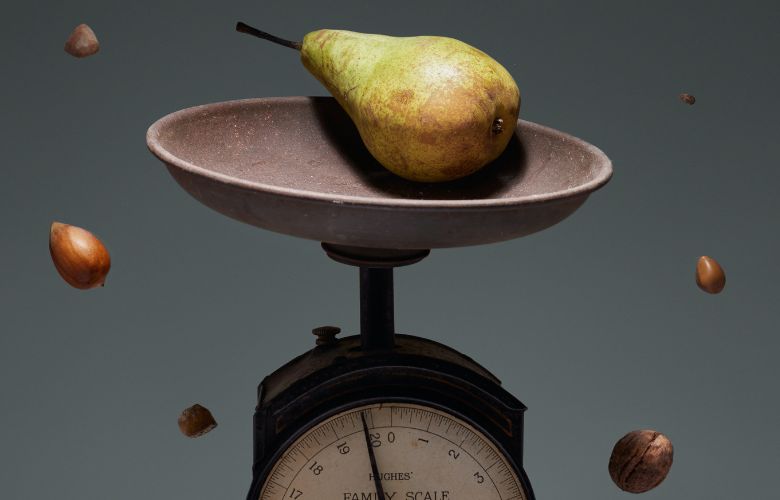
The truth about calories for performers has long been overshadowed by the myths – these dangerous ideas include thinking you need to cut calories in order to be “healthy”, or to have the “ideal body type” If you’ve ever thought this, you are certainly not alone. This myth has been circulated in popular culture for years and has dominated the performing arts industry. Sadly, this is harmful to young, vulnerable performers, who hear it from well-meaning, albeit misguided, teachers, peers, and social media influencers. I am on a mission to bust this myth and rid it of our industry, once and for all. I will start by breaking down how this myth became part of popular culture so we can better understand and hopefully move past believing that calories are king.
Long before the calorie was invented, human beings got by just fine without it. They would eat when they were hungry and stop eating when they were full. As human beings who are part of nature, we have built in natural instincts that send us hunger signals to help us decide what types of foods we need, and when we need to eat them. Modern society has unfortunately shut us off from these instincts.
But where did the calorie even come from?
The earliest known record of the calorie goes back to a French chemist named Nicholas Clément, defining the term in 1819. The calorie was originally used as a measurement tool in physics and engineering, and had nothing to do with nutritional science. The calorie made its way to nutritional science, largely thanks to the work of the American chemist, Wilbur Atwater, around 1887. But it didn’t make its way into popular culture until 1918, when physician Lulu Hunt Peters wrote the book, “Diet and Health; With Key to the Calories.” In this book, she made the claim that,
“Hereafter, you are going to eat calories of food. Instead of saying one slice of bread, or a piece of pie, you will say 100 calories of bread, 350 calories of pie.”
This book was hugely successful and saw the shift from seeing food as fuel to seeing it as a numbers game. This shift was largely amplified by World War 1, where food rationing had become common.
Counting calories became tied to morality.
If you could restrict your calories, it meant that you were showing love for your country, and therefore maintaining a “decent” body weight meant that you were a good person.
A calorie is simply a unit of energy, much like a metre is a unit of distance. Food companies use a method called the Atwater System to measure the amount of calories in their food. Using this system, each gram of protein contains 4 calories, each gram of carbohydrate contains 4 calories, and each gram of fat contains 9 calories.
For example, say you have a bottled smoothie that contains 10 grams of protein, 25 grams of carbohydrates, and 7 grams of fat. The protein calculation would work out to be 10 x 4 = 40 calories, the carbs would be 25 x 4= 100 calories, and the fat works out to be 7 x 9= 63 calories, for a total of 203 calories on the label.
The problem with calories is that it completely ignores the complexity of digestion. Each of us has a unique metabolic fingerprint that affects how certain foods interact with our bodies, that differs from anyone else’s. Other things that simply going by counting calories doesn’t take into consideration include:
What really matters is what your body does with the food it consumes. Ask yourself:
Many performers don’t realise that these things are affected by the food we eat. This is why it is so important to stop focusing on calories, and instead, shift the focus on how you want to feel. So here are some better markers for you to look out for regarding food.
Do you feel depleted and fatigued at the end of each day? If you are struggling to find the energy to get through your classes, auditions, or performances, chances are you are not consuming enough food to fuel your body. Start by increasing the amount of protein (from foods like beef, lamb, poultry, beans, peas, nuts, protein powder, etc.) and complex carbohydrates (from foods like fruit, vegetables, and whole grains) that you eat, and track how your energy levels progress.
Are you constantly hungry? If you find yourself feeling this way, it may be time to increase the amount of food you are eating, but also make sure to include foods that will give you lasting energy and help you feel full. Eating lots of protein, fibre, and healthy fats like nuts, seeds, avocados, and olive oil, will help you achieve this.
Having lots of cravings and finding yourself thinking about food constantly could be another sign that you aren’t eating enough. It could also mean that you are eating lots of sugar and not enough protein, fibre, and fat. Are you skimping on meals and then eating chocolate bars to boost your energy? This leads to more cravings and hunger throughout the day.
Do you get irritable and anxious? This could mean you are not consuming enough food throughout the day. This is because fasting for long periods of time can cause cortisol (a stress hormone) levels to rise, causing us to have feelings of anxiety and moodiness. Try not to go longer than 3-4 hours without eating.
Certain foods are harder for our bodies to digest. This is because we all have a unique microbiome that affects how foods interact with our bodies. If you are feeling gassy and bloated after eating, start making a note of how you feel after each meal. This way you can pinpoint the foods that make you feel great, and the foods that don’t.
Are you able to focus with ease, concentrate in classes and easily memorise your lines? Or do you struggle with concentration and memorisation? If you are struggling, a good place to start is to increase the amount of healthy fats in your diet, such as olive oil, avocados, nuts and seeds, fatty fish like salmon and mackerel, and coconut oil. You should also increase the amount of complex carbohydrates you eat, such as fruit, vegetables, and whole grains, because glucose is your brain’s preferred source of fuel.
Certain foods improve our sleep quality, while others do the opposite. Foods such as bananas, avocados, nuts and seeds, leafy greens, and beans have been found to improve sleep quality, while foods and beverages containing caffeine can be sleep-disrupting, and are best avoided 4-5 hours before bed. Spicy, acidic, and fried foods should also be limited, as they can increase indigestion before bedtime.
Food is so much more than just calories. I am a firm believer in doing away with the notion of “calories in, calories out.” I never encourage my clients to count calories, as I believe it can be incredibly harmful for our physical and mental health.
Much better indicators of health when it comes to food and diet include no intense hunger between major meals, no cravings, and experiencing increased energy.
If you are feeling anxiety, depression and moodiness between meals, indigestion and bloating, these symptoms can be related to food intake and should be examined by a professional.
Love to write or have something to say? Become a contributor with TheatreArtLife. Join our community of industry leaders working in artistic, creative, and technical roles across the globe. Visit our CONTRIBUTE page to learn more or submit an article.


Originally from Barbados, Crystal Nicholls is a Professional Dancer and Nutrition Coach, based in London. She has performed on tv, the high seas, and Disney’s The Lion King. Through her 1:1 coaching programs, she helps high level performers overcome stress, to find balance in their lives and achieve their goals.
Read Full Profile© 2021 TheatreArtLife. All rights reserved.

Thank you so much for reading, but you have now reached your free article limit for this month.
Our contributors are currently writing more articles for you to enjoy.
To keep reading, all you have to do is become a subscriber and then you can read unlimited articles anytime.
Your investment will help us continue to ignite connections across the globe in live entertainment and build this community for industry professionals.